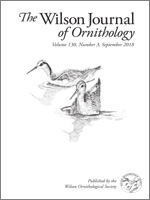Both weather and parental care can influence avian reproductive success, yet few studies have investigated these 2 factors simultaneously. Examining these factors under a common framework is informative because they may interact to influence overall productivity; for example, weather could directly influence nestling survival or could act indirectly by influencing rates of provisioning. To tease apart these possibilities, we used piecewise structural equation modeling and path analysis to assess the relative influence of local weather (temperature and rainfall) and rates of provisioning on the fledging success of Mountain Bluebirds (Sialia currucoides) breeding in nest boxes. Both ambient temperature during the nestling period and provisioning rates influenced fledging success, but this finding was dependent on nest box entrance type. Bluebirds nesting in boxes with a hole-shaped entrance had higher overall fledging success than those using boxes with a slot-shaped entrance and exhibited a positive association between fledging success and provisioning rates but a negative association with temperature. Bluebirds nesting in boxes with a slot-shaped entrance experienced reduced fledging success, and success was only weakly associated with provisioning rates. Reduced fledging success for birds nesting in slot boxes may be due to increased exposure and higher susceptibility to stochastic events (e.g., storms), which may also mask any effects of parental effort on success rates. Based on these findings, we recommend the use of nest boxes with hole-shaped rather than slot-shaped entrances when managers and conservation groups establish new bluebird routes or replace existing boxes.
How to translate text using browser tools
1 September 2018
The influence of weather and parental provisioning on fledging success depends on nest box type in a cavity-nesting passerine, the Mountain Bluebird (Sialia currucoides)
Sarah L. Leroux,
Ann E. McKellar,
Nancy J. Flood,
Mark J. Paetkau,
Jacob M. Bailey,
Matthew W. Reudink
ACCESS THE FULL ARTICLE
fledging
mountain bluebird
nest box
Parental care
Provisioning
weather





